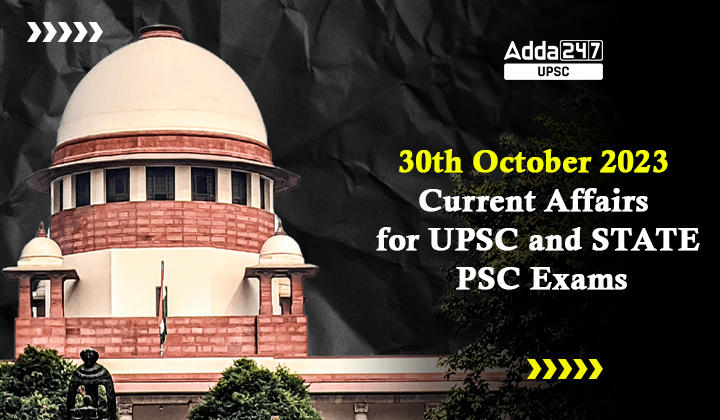Table of Contents
30th October 2023 Current Affair: These current affairs updates for October 30th, 2023, provide valuable information to aid your preparation for UPSC Current Affairs 2023 and State PSC exams. The news headlines covered in the current affairs for October 30th, 2023 include The UN Security Council’s Role in the Israel-Hamas Conflict, Exploring the SIM Swap Scam and Various Types of Cybercrime, The Lewis Model: Achievements in China and Obstacles in India, Jammu and Kashmir’s Power Crisis: Understanding Causes, Consequences, and Exploring Solutions.
1) The UN Security Council’s Role in the Israel-Hamas Conflict
- International Attention: The Israeli-Hamas conflict continues to capture global attention, with concerns about civilian casualties and regional instability.
- Rejected Resolutions: The fact that both American and Russian resolutions related to the conflict were rejected highlights the complexity of the issue and the difficulties in finding common ground within the UNSC.
- Regional Implications: The conflict has broader implications for the Middle East region and can affect neighboring countries, making it a matter of regional as well as global concern.
- Calls for Diplomacy: The deadlock in the UNSC underscores the urgent need for diplomatic efforts, with various countries and organizations calling for a ceasefire and negotiations to end the violence.
2) Exploring the SIM Swap Scam and Various Types of Cybercrime
- Phishing: Phishing is a deceptive technique where cybercriminals send fraudulent emails, messages, or websites that appear legitimate to trick individuals into revealing personal information, such as login credentials or financial details.
- Ransomware Attacks: Ransomware attacks involve malware that encrypts a victim’s data, rendering it inaccessible. Cybercriminals demand a ransom to provide the decryption key, often targeting individuals, businesses, or government organizations.
- Identity Theft: Identity theft occurs when an individual’s personal information, such as their Social Security number or financial data, is stolen and misused for fraudulent activities, such as opening fraudulent bank accounts or making unauthorized purchases.
- Distributed Denial of Service (DDoS) Attacks: DDoS attacks involve overwhelming a target website or network with an excessive volume of traffic, causing it to become slow or unavailable. These attacks disrupt online services and can be used for extortion or revenge.
3) Jammu and Kashmir’s Power Crisis: Understanding Causes
- Transmission Losses: Inefficient transmission and distribution infrastructure contribute to power losses, reducing the overall availability of electricity to consumers.
- Rising Cost of Procurement: The increasing cost of procuring electricity from other sources to meet the deficit adds financial strain to the power distribution system and can lead to higher electricity prices for consumers.
- Impact on Residents: The power crisis has adverse effects on residents, including scheduled power cuts, impacting daily life, businesses, and industries.
- Economic Consequences: Insufficient and unreliable power supply affects economic activities and investments in the region, hindering economic growth and development.
4) The Lewis Model: Achievements in China and Obstacles in India
- Sectoral Imbalance: India’s experience reveals a persistent imbalance in its labor force, with a large proportion still engaged in agriculture despite urbanization and economic growth.
- Service Sector Dominance: The rapid expansion of the services sector in India, particularly in IT and business process outsourcing, played a significant role in absorbing a substantial portion of the labor force that might have otherwise transitioned to manufacturing.
- Economic Challenges: Factors such as the slow pace of economic reforms, inadequate infrastructure, and regulatory barriers have hindered the development of a robust manufacturing sector in India.
- Diverse Economic Realities: India’s diverse economic landscape, characterized by variations in regional development, also contributes to the complex and uneven implementation of the Lewis Model.



 TSPSC Group 1 Question Paper 2024, Downl...
TSPSC Group 1 Question Paper 2024, Downl...
 TSPSC Group 1 Answer key 2024 Out, Downl...
TSPSC Group 1 Answer key 2024 Out, Downl...
 UPSC Prelims 2024 Question Paper, Downlo...
UPSC Prelims 2024 Question Paper, Downlo...
